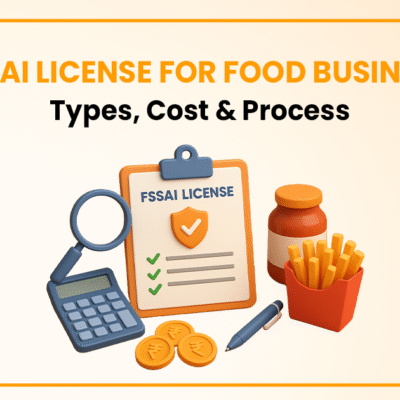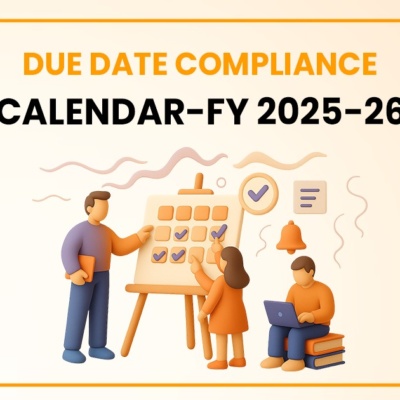
The Ministry of Micro, Small, and Medium Enterprises (MSME) was approved in India in 2006. Enterprises in the manufacturing sector and enterprises in the service sector are the two types of enterprises that can register under the MSME Act. The pillar of strength for the country’s economy is MSME. Micro, small, and medium enterprises are very important for both developed and developing countries. MSME is required to boost the economy and employment of the nation. In this article, we will discuss MSME compliances.
| Table of Contents |
What is an MSME?
MSME stands for Micro, Small, and Medium Enterprises. The term refers to a class of business units of a certain range of size and annual turnover. In India, MSMEs are defined based on the investment in plant and machinery or equipment for production activities. There are some criteria for the classification of MSMEs as per the MSME Development Act of 2006:
Micro Enterprises: Micro enterprises are defined as enterprises where investment in plant and machinery or equipment does not exceed Rs. 1 crore and the annual turnover is up to Rs. 5 crores.
Small Enterprises: Small enterprises are defined as enterprises where the investment in plant and machinery or equipment exceeds Rs. 1 crore and up to Rs. 10 crore. The annual turnover is between Rs. 5 crores and Rs. 50 crores.
Medium Enterprises: Medium enterprises are defined as enterprises where the investment in plant and machinery or equipment exceeds Rs. 10 crores and up to Rs. 50 crores. The annual turnover is between Rs. 50 crores, not Rs. 250 crores.
Importance of MSME Compliance
Compliance with laws and regulations is not only a legal requirement, but also a business imperative. Failure to comply can lead to serious consequences such as sanctions, fines, legal action, loss of reputation, and even business closure.
In addition, compliance helps SMEs build credibility, gain the trust of their customers, investors, and other stakeholders and create a level playing field for all market players.
Reasons for MSME
The Government of India has introduced Micro, Small, and Medium Enterprises (MSME) Development to facilitate the promotion and development of MSMEs for the following reasons:-
- Improve the implementation of SME payments
- To implement statutory consultation and referral policies,
- Establish statutory MSME registration procedures and a statutory basis for purchasing preferences and credit policies
- To remove obstacles caused by multiple laws.
MSME compliances
Section 9 of the MSMED ((Micro, Small and Medium Enterprises Development) Act defines specific companies for which MSME Form 1 is very important compliance.
These specified companies submit MSME Form 1 once every six months to the Ministry of Corporate Affairs (MCA).
The listed companies are required to submit an annual return of outstanding payments to MSMEs to the Registrar of Companies (ROC) every year, which includes information on the amount due for payment and the reason for the delay. The above companies can file MSME Form 1 only if their outstanding payment to MSME suppliers has exceeded 45 days.
MSME Form 1 (MCA)
MSME Form 1 shows detailed and complete information with the registrar about outstanding payments to micro or small enterprises for more than 45 days in a half-year. The Ministry of Corporate Affairs has made changes to the protection and safeguarding of the interests of small businesses or enterprises.
MSME Form 1 on a half-yearly basis has to be filed by specified enterprises operating in India as MSME. To close the outstanding fees, these businesses must file the form and it must be filed within 30 days of the notification.
The MSME compliances that you should be aware of are-
- Every MSME operating in India has a match. Compliance is mandatory for running MSME businesses.
- Section 9 of the Micro, Small, and Medium Enterprises Development (MSMED) Act 2006 defines MSME Form 1. The said form should be filed on time.
- In India, every MSME has to file MSME Form 1 with the Ministry of Corporate Affairs of India once every six months.
- Director/CS/CEO/CFO/Manager can sign MSME Form 1 electronically as they are authorized by the company.
- DIN details for Director and Manager, Company Secretary, CEO, and CFO PAN card details must be provided.
- In the case of a supplier; FYI form, supplier name, PAN details of the supplier, the amount due and date from which the amount was due, the reason for late payment and if there is any optional attachment it must be. This data must be provided by each supplier.
Duties of MSME
Every MSME has several basic responsibilities after completing the registration process.
MSME Registration is not enough for MSME operations, all companies must meet mandatory compliances for MSME operations. The main duties include:
- All MSME suppliers must be registered under the MSME Act.
- If there is any payment due at the end of the financial year, MSME has to check it. The due date of payments must not be longer than 45 days from the receipt of goods and services.
- Filing of Payables Returns is a must and must be done by all MSMEs. In MSME Form 1 this would be done and the reason for the delay should be mentioned.
Certain specifications are required such as:-
- The total amount due is essential
- Supplier company information
- The liability starts on a certain date, so the date from which the liability started should be given.
- PAN card of supply companies is a must.
Penalties
It is mandatory to comply with these agreements, otherwise, there would be sanctions for non-compliance. An MSME that fails to comply will be liable for the penalties listed below-
- Under Section 405(4) of the Companies Act, 2013, a defaulting company would be fined INR 25,000.
- Under this provision, any officer who failed to comply would also be liable to imprisonment for six months.
Final words
Navigating the regulatory landscape is a necessary aspect of running a successful MSME. By understanding and complying with the relevant regulations, MSMEs can avoid penalties, gain access to benefits and incentives, and build a sustainable business. Entrepreneurs must stay updated with changes in the regulatory framework and seek professional guidance when needed. However various government schemes have been introduced to support MSME in India. With the simplification of compliances through online registration processes and initiatives, MSMEs can focus more on their core business activities and drive growth and prosperity in the economy.
CS Urvashi Jain is an associate member of the Institute of Company Secretaries of India. Her expertise, inter-alia, is in regulatory approvals, licenses, registrations for any organization set up in India. She posse’s good exposure to compliance management system, legal due diligence, drafting and vetting of various legal agreements. She has good command in drafting manuals, blogs, guides, interpretations and providing opinions on the different core areas of companies act, intellectual properties and taxation.
Categories
- Agreement Drafting (23)
- Annual Compliance (13)
- Change in Business (37)
- Company Law (150)
- Compliance (90)
- Digital Banking (3)
- Drug License (4)
- FEMA (17)
- Finance Company (42)
- Foreign Taxation (9)
- FSSAI License/Registration (15)
- GST (123)
- Hallmark Registration (1)
- Income Tax (213)
- Latest News (34)
- Miscellaneous (170)
- NBFC Registration (8)
- NGO (18)
- SEBI Registration (6)
- Section 8 Company (10)
- Start and manage a business (27)
- Startup/ Registration (134)
- Trademark Registration/IPR (48)
Recent Posts
All Website Tags
About us
LegalWindow.in is a professional technology driven platform of multidisciplined experts like CA/CS/Lawyers spanning with an aim to provide concrete solution to individuals, start-ups and other business organisation by maximising their growth at an affordable cost.








